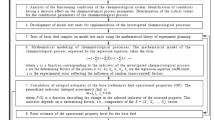A cost-effective method of managing requirements for the performance properties of fuels and lubricants (FLs) is presented. Performance requirements are detailed in the form of conceptual and empirical models, along with their quantitative expression through highly informative indicators showing the propensity of FLs for various transformations, practical evaluation, specification, implementation, effectiveness evaluation, and modification. The proposed method ensures improved equipment life cycle efficiency based on the use of FLs. Examples are given to illustrate some provisions of the new method as applied to the properties of motor fuels and hydraulic fluids.




Similar content being viewed by others
References
K. K. Papok, Chemmotology of Fuels and Lubricants [in Russian], Voenizdat, Moscow (1981).
A. A. Bratkova (ed.), Theoretical Foundations of Chemmotology [in Russian], Khimiya, Moscow (1985).
A. A. Gureev, I. Cx Fuks, and V. L. Lashkhi, Chemmotology [in Russian], IChimiya, Moscow (1986).
E. I. Gulin, D. P. Yakubo, V.A. Somov, et al., Handbook on Fuels and Lubricants in Marine Technology [in Russian], Sudostroenie, Leningrad (1987).
Yu. M. Pimenov, V. A. Sereda, and A. V. Ulit’ko, Mir Nefteprod., No. 6, 19-29 (2019).
V. A. Venikov and G V Venikov, Theory of Similarity and Modeling Applied to the Problems of the Electric Power Industry [in Russian], Librokom, Moscow (2014).
L. Skyttner, General Systems Theory: Problems, Perspectives, Practice, World Scientific, NJ (2005).
J. L. Devore, Probability and Statistics for Engineering and the Sciences, Cengage Learning, Boston (2016).
V. S. Pugachev, Theory of Random Functions and its Application to Automatic Control Problems [in Russian], Fizmatgiz, Moscow (1960).
S. M. Ermakov and A. A. Zhiglyayskii, Mathematical Theory of Optimal Experiments [in Russian], Nauka, Moscow (1987).
Yu. M. Pimenov, A. V. Ulit’ko, and V. A. Sereda, Khim. Tekhnol. Topl. Masel, No. 2, 39-47 (2020).
Yu. M. Pimenov, A. V. Ulit’ko, and V. A. Sereda, Khim. Tekhnol. Topl. Masel, No. 5, 36-43 (2020).
W.Cochran, Sampling Techniques [Russian translation], Statistika, Moscow (1976).
M. Kendall and A. Stuart, The Advanced Theory of Statistics [Russian translation], Nauka, Moscow (1973).
Yu. M. Pimenov and V. A. Sereda, Mir Nefieprod., No. 2, 26-35 (2019).
Yu. M. Pimenov and A. V. Ulit’ko, Khim. Tekhnol. Topl. Masel, No. 3, 10-15 (2019).
Yu. M. Pimenov and I. V. Poplayskii, Mir Nefieprod., No. 3, 43-56 (2020).
D. C. Montgomery, Design and Analysis of Experiments, Wiley, N. Y. (2019).
V. V. Fedorov, Theory of Optimal Experiments [in Russian], Nauka, Moscow (1971).
Author information
Authors and Affiliations
Corresponding author
Additional information
Translated form Khimiya i Tekhnologiya Topliv i Masel, No. 2, pp. 16 – 24, March – April, 2021.
Rights and permissions
About this article
Cite this article
Pimenov, Y.M., Ulit’ko, A.V. & Sereda, V.A. Method for Managing Fuel and Lubricant Performance Requirements. Chem Technol Fuels Oils 57, 230–242 (2021). https://doi.org/10.1007/s10553-021-01243-w
Published:
Issue Date:
DOI: https://doi.org/10.1007/s10553-021-01243-w




